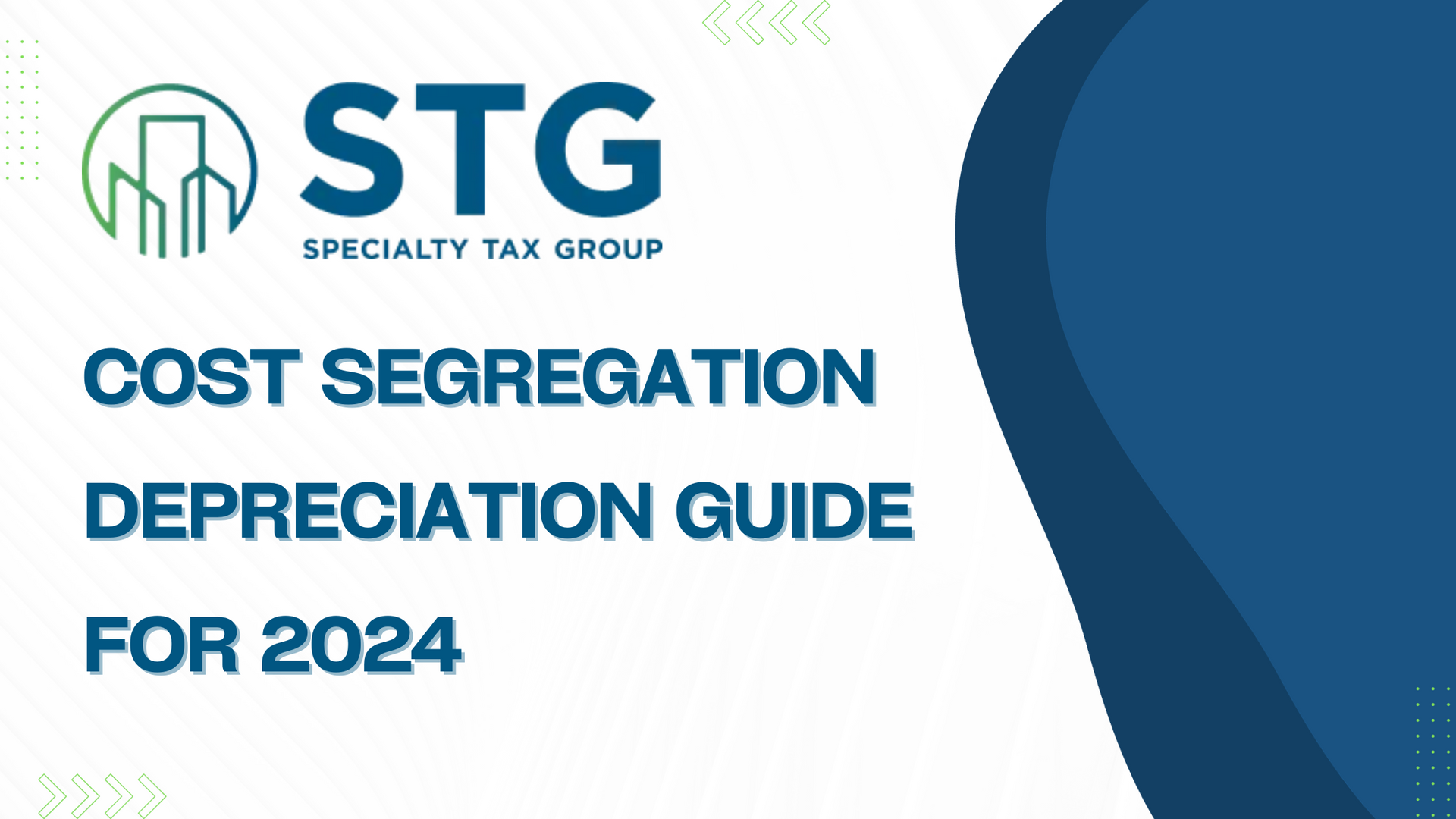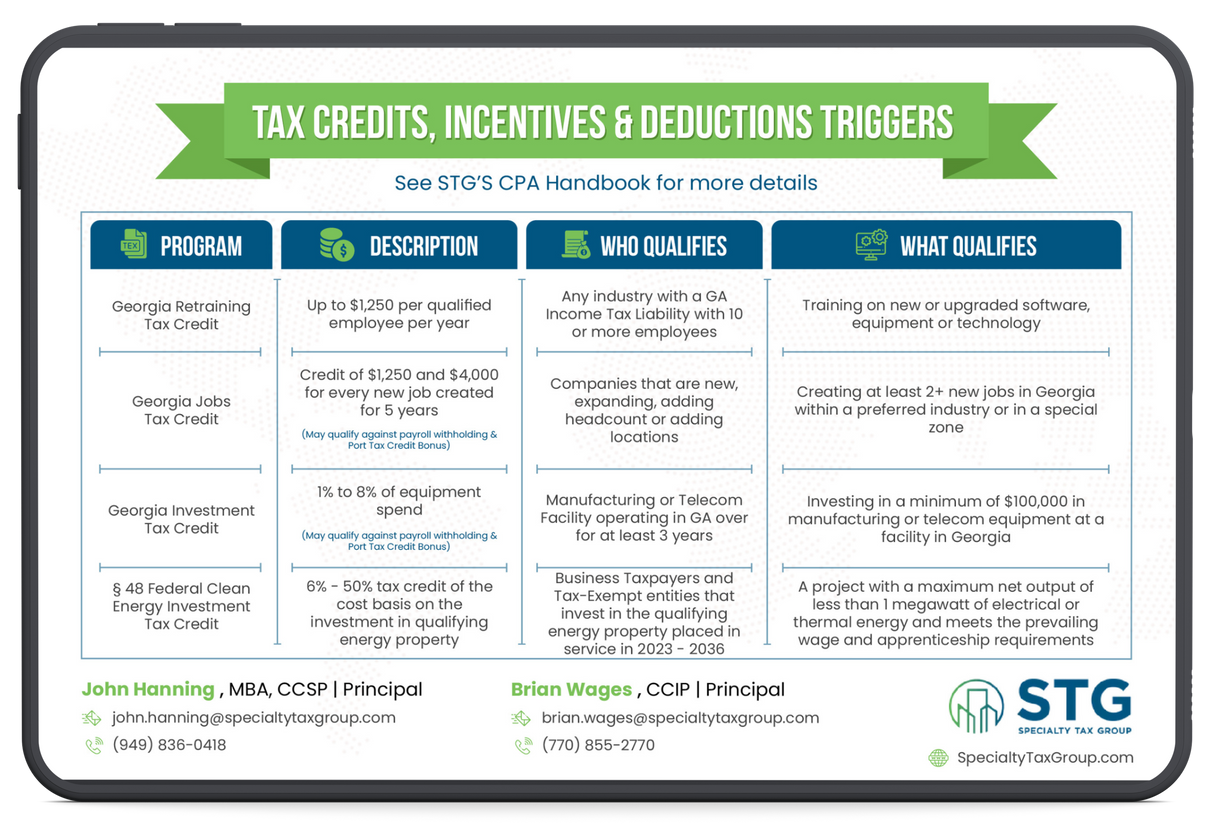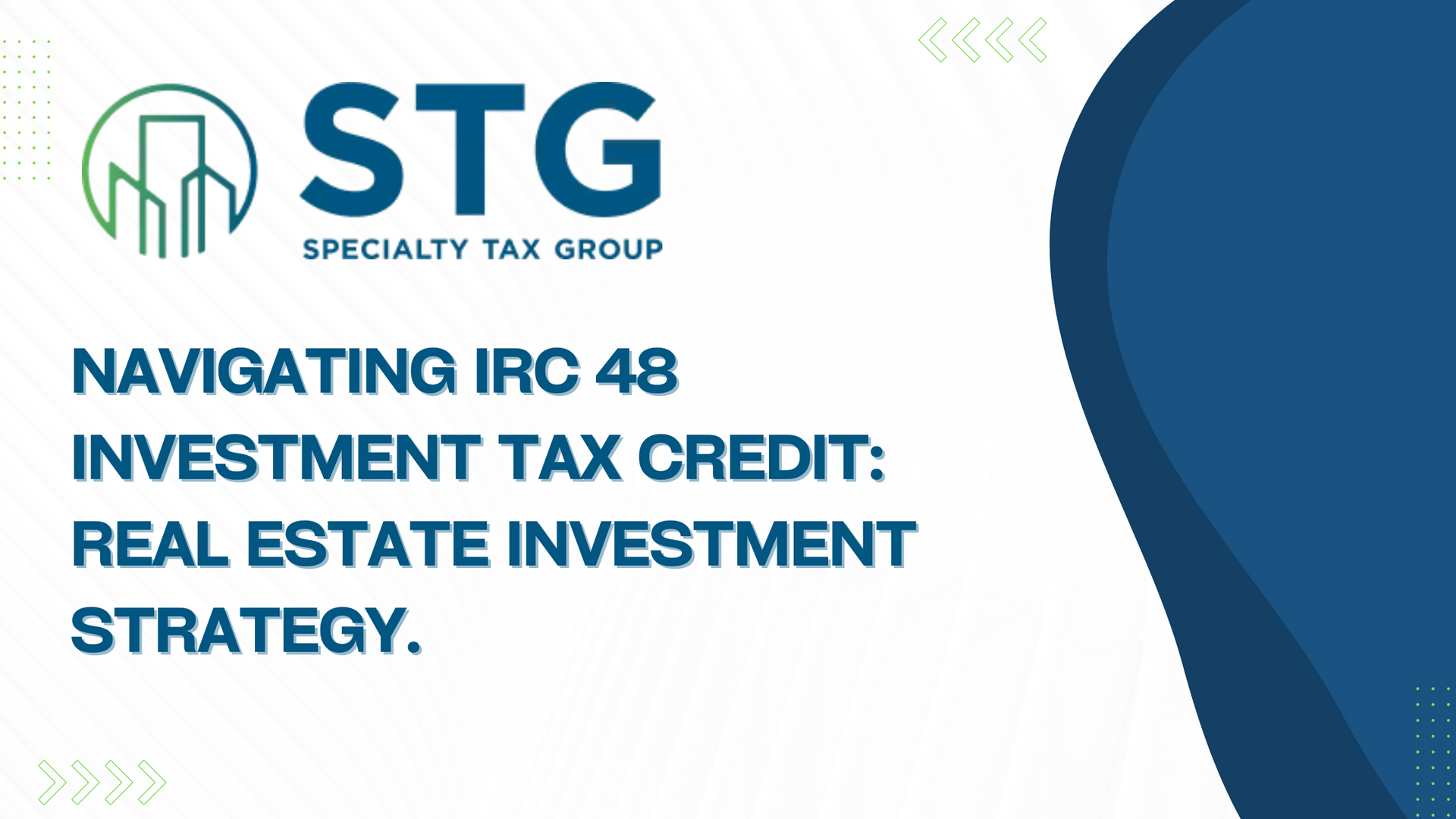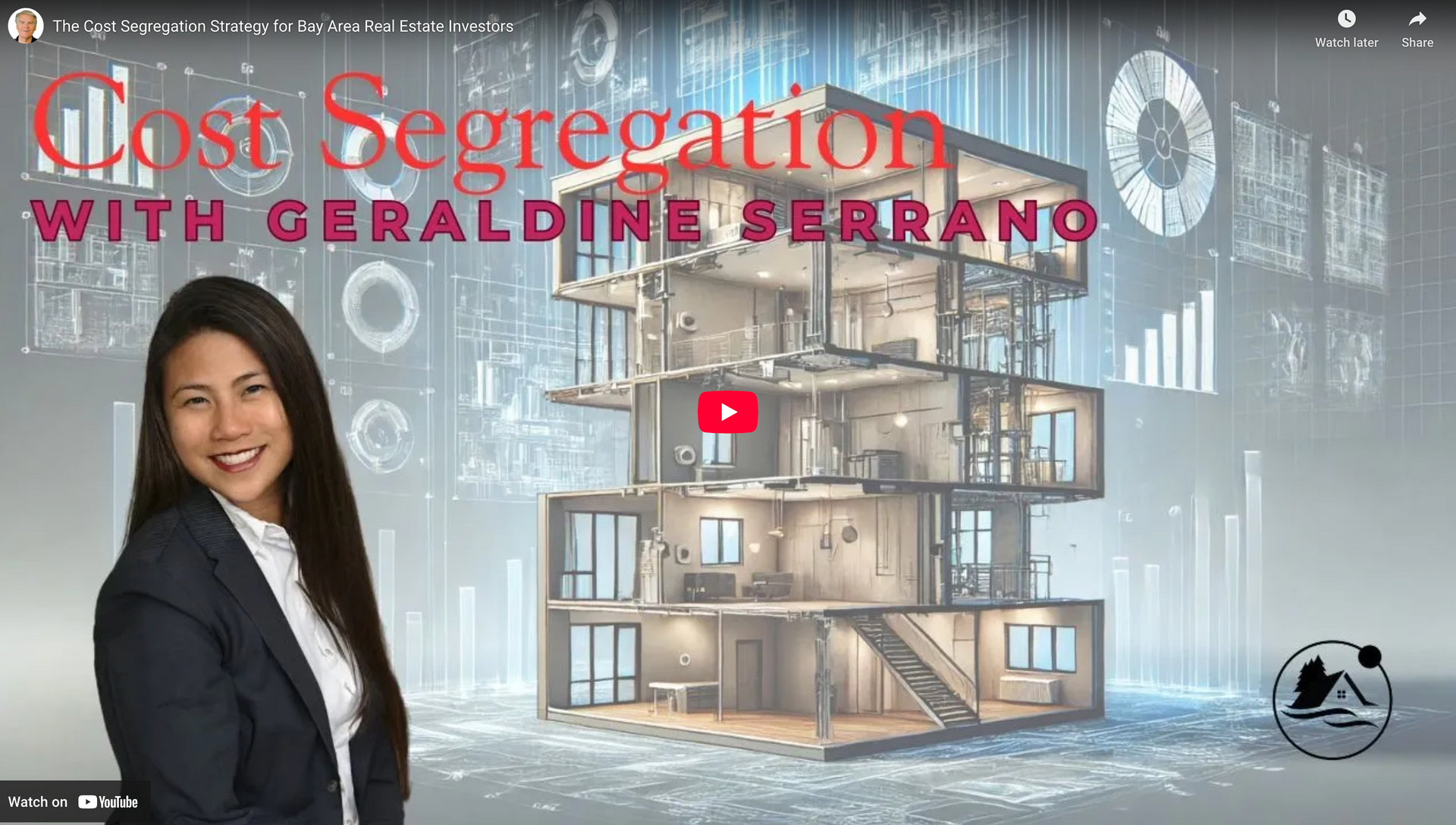This blog post has been researched, edited, and approved by John Hanning and Brian Wages. Join our newsletter below.
Newsletter Form
As we approach 2024, it's imperative for property owners and investors to acquaint themselves with a powerful, yet often underutilized, financial tool: Cost Segregation. This strategy has become a powerful cash flow tool in the ever-evolving world of real estate and taxation.
The Rising Importance of Cost Segregation
Cost Segregation stands as a beacon of opportunity in the complex terrain of property investment. It's more than just an accounting practice; it's a strategic approach that can unlock considerable financial benefits. With its ability to accelerate depreciation deductions, cost segregation is transforming how investors manage their assets and optimize their tax strategies.
Understanding the nuances of cost segregation has never been more crucial, especially in light of recent legislative shifts. A pivotal change was the conclusion of the 100% bonus depreciation period at the end of 2022. This allowed businesses to fully deduct the cost of qualifying assets in the year they were placed in service, providing a substantial immediate tax relief.
However, the landscape shifted dramatically from 2023 onwards.
The bonus depreciation rate started its descent, decreasing by 20% annually. This gradual reduction brings a new set of challenges and opportunities for 2024 and beyond. In 2024, the bonus rate stands at 60%, making the strategic use of cost segregation vital for maximizing tax benefits.
Understanding Cost Segregation
Imagine you've just acquired a commercial property. Cost segregation dissects this asset into various components. It's like financial detective work, where parts of your property—ranging from land improvements to personal property assets—are reclassified. This reclassification enables these components to depreciate over a shorter period, compared to the standard 27.5 or 39 years for residential and commercial properties, respectively.
What does this mean for a property owner? Simply put, it's about front-loading tax deductions. Claiming larger depreciation expenses in the initial years leads to a welcome reduction in tax liability in the current year. This strategy isn't just about saving money; it's about enhancing cash flow, enabling investors to recoup their investment sooner.
Leveraging Cost Segregation for Financial Efficacy
Instead of spreading the depreciation of a building's cost over decades, this method breaks down the property into components with shorter lifespans. Think of it as reassigning parts of your building to a fast track for depreciation. This shift means you can claim larger tax deductions sooner, effectively diminishing your taxable income more rapidly than traditional methods would allow.
From the IRS's viewpoint, cost segregation is a legitimate, though intricate, maneuver. It's about adhering to the detailed guidelines that dictate how different property components depreciate over time. By engaging in this practice, you're not just saving on taxes; you're aligning your strategy with a deeper understanding of tax regulations.
Immediate Gains and Long-Term Benefits
Remember the 100% bonus depreciation period that concluded in 2022? By classifying your assets, you can still snag a substantial portion of this bonus, allowing for full-cost deductions in the year assets are put into service. For businesses, this translates to an immediate reduction in tax liability and a boost in cash flow.
This strategic front-loading of depreciation deductions creates a financial ripple effect. In the short term, you see an uptick in cash flow, vital for day-to-day operations or reinvestment. Long-term, it's about creating a more sustainable financial structure for your business, aligning your investment strategy with evolving tax landscapes.
Decoding the Basics of Depreciation
In the realm of property investment, depreciation is a concept that stands at the crossroads of finance and real estate, a subtle yet powerful force shaping the financial landscape. It represents the gradual decline in the value of a property, attributed to factors like wear and tear, aging, and obsolescence.
Depreciation is a practical tool that echoes through a property owner's financial statements. It spreads the cost of acquiring a property over its useful life, offering a realistic snapshot of the property's financial standing. This accounting practice is pivotal for property owners, as it facilitates the recovery of their investment over time. By acknowledging depreciation, owners can effectively manage their taxable income, reflecting the diminishing value of their assets in a tangible, fiscal manner.
Accelerated Depreciation Through Cost Segregation
This strategy reimagines the tax depreciation process by dissecting a property into its individual components—electrical systems, plumbing, decorative elements, exterior improvements, and more. Each element is then assigned an appropriate depreciation period. This reclassification leads to accelerated depreciation for certain components, allowing property owners to claim higher deductions in the earlier years of ownership.
Comparing Standard and Segregated Depreciation
Let's contrast standard depreciation with depreciation via cost segregation:
- Standard Depreciation:
This traditional approach applies a uniform depreciation rate across the entire cost of an asset over its predefined useful life. It's a one-size-fits-all method, offering a gradual, linear, straight-line depreciation without acknowledging the individual nuances of a property's components.
- Depreciation with Cost Segregation: In contrast, this method dives deeper, examining the distinct parts of an asset and applying varied depreciation rates accordingly. It considers the assets used and how it's connected to the structure. This results in an expedited depreciation for certain components, carving a path for heightened tax savings.
Standard straight-line depreciation offers a steady, predictable pattern, while cost segregation introduces a dynamic, nuanced approach, enhancing tax savings and creates cash flow in the early stages of property ownership.
Navigating Cost Segregation in 2024: A Strategic Blueprint
Embarking on a cost segregation journey in 2024 begins with a meticulous initial assessment of your property. This foundational step is pivotal in laying the groundwork for a successful cost segregation strategy.
- Gathering Essential Documentation: Your first task is to gather all relevant documents related to your property. This includes the purchase agreement, detailed construction costs, renovation expenses, and any other pertinent financial records. Having a comprehensive understanding of your property’s history, acquisition, and development is critical.
- Finding a Cost Segregation Specialist: Once your documentation is in order, the next vital step is to bring a qualified cost segregation specialist into the picture. These experts, with their profound grasp of tax laws and cost segregation intricacies, are instrumental in conducting a thorough and defensible analysis of your property. Their expertise ensures an accurate and beneficial segregation of assets. They should also be a Certified Member of American Society of Cost Segregation Professionals (ASCSP).
- The Specialist's Role: Analysis and Classification: Following an in-depth site visit, the cost segregation specialist delves into the details. They scrutinize blueprints, construction records, and other key materials, piecing together a comprehensive view of the property. The specialist's task is to identify and classify assets into categories like personal property, land improvements, or real property, each with its unique depreciation schedule. This classification is crucial for maximizing tax benefits.
- Culminating in a Detailed Report: The final output of this process is a detailed cost segregation report. This document is a treasure trove of insights, listing the property’s components, their costs, and the recommended depreciation periods. Backed by meticulous documentation and calculations, this report is a robust tool for property owners and tax advisors, ensuring compliance with IRS regulations while optimizing tax savings.
The Indispensable Role of Tax Professionals
The expertise of tax consultants and specialized accountants cannot be overstated. These professionals are the navigators of the complex tax landscape, equipped with up-to-date knowledge of evolving tax laws and regulations.
Tax laws are similar to a shifting maze, with new paths emerging and old ones closing. Tax consultants and accountants are the guardians of this knowledge, providing insights and strategies tailored to your unique situation.
By enlisting the help of these experts, you not only ensure compliance with current regulations but also position yourself to capitalize on emerging opportunities. Their foresight and guidance are invaluable in navigating the nuances of cost segregation, ensuring that you maximize your tax benefits while mitigating liabilities.
Elevate Your Investment Strategy with STG
At Specialty Tax Group (STG), we understand the intricacies of cost segregation and are committed to helping you maximize your investment returns. Our team of experts offers comprehensive cost segregation analysis and consulting services, tailored to meet the unique needs of your property investments.
Visit
our website, or
contact us directly to schedule a consultation. Harness the power of cost segregation and propel your investments forward with Specialty Tax Group – your partner in strategic tax planning.
Get Started Today






